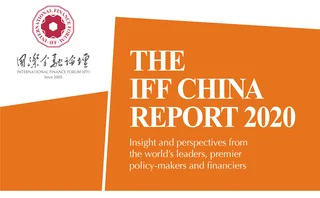
The long march to global growth


The Fourth Plenary Session of the 19th Central Committee of the Communist Party of China, which concluded in October 2019, formulated a comprehensive plan to uphold China’s socialist system and accelerate the modernisation of the country’s governance. This included changes to the financial sector, where requests for stronger governance will result in changes to the institutional structure of firms and ensure more stable financial development.
Financial stability – A global issue
Since the global financial crisis that began in 2007–08, regulators worldwide have viewed maintaining financial stability as a core task and adopted a series of measures, including improving monetary policy, strengthening supervision and optimising financial structures. The goal is to improve the governance and strengthen the stability of the financial system, and mitigate the destructive power of the crisis. The Financial Stability Board (FSB), the Basel Committee on Banking Supervision, the International Association of Insurance Supervisors and other international regulatory organisations have introduced a series of regulatory reform measures to improve regulatory standards and promote regulatory co-operation to enhance risk management capabilities.

At the same time, the global political, economic and financial landscape has become more complicated. Global economic growth is slowing, and the momentum of major developed and emerging economies has weakened. Organisations such as the International Monetary Fund and the World Bank have downgraded forecasts for global growth. In response to economic downturn, the US, Japan and other major economies have resorted to quantitative easing by pumping more currency into circulation and depreciating their local currencies, which has caused spillovers into exchange rates, capital markets stability and liquidity in emerging economies. In some countries, because of negative interest rates, the capacity for monetary policy was compressed. Many countries increased their fiscal expenditure, resulting in a sharp rise in government debt and ballooning deficits. Some are already facing financial difficulties, and others have adopted protectionist stances, increasing trade frictions that are further choking global growth.
Geopolitical risks are also threatening the stability of global economic markets. On the whole, global economic and financial risks are rising to a worrying level, the diminishing effect of economic stimulus policies poses a threat and the maintenance of financial stability will be a long march.
Steady as she goes
In recent years, China’s financial supply-side structural reform agenda has been further advanced, and the corporate financial system has been running smoothly, its risks firmly under control. This has provided strong financial support for the steady and sound development of the economy.
On the whole, China has maintained financial stability thanks to a number of measures. First, policies to improve economic development have given China opportunities to enhance its financial services. Currently, new forms of industry, such as advanced manufacturing, IT, green environmental protection and ‘resident services’ – which are defined as those that contribute to the improved livelihood of the population – have increased the pace of economic growth. These new, thriving industries are now driving economic development, which allows greater innovation in the financial services sector. At the end of the third quarter of 2019, bank loans had grown year-on-year in high-end equipment manufacturing (42.1%), IT services (17.4%) and technology services (35.3%). The growth rate was significantly higher than that of all other loans. The outstanding green credit of major banks exceeded CNY10 trillion, accounting for almost 10% of all loans.
Second, China’s macro policy has allowed more space for flexibility. Countercyclical mediation has been strengthened to within a reasonable range to ensure internal stability and economic performance. China has recently enacted various policies and measures for orderly structural deleveraging and maintained the stability of the leverage ratio, an important instrument for defusing financial risks.
Third, by mitigating and defusing accumulated financial risks, China’s financial sector has gained further expertise. Over the past few years, measures have been taken to correct disorder and dislocation in the financial sector. Since 2017, regulatory bodies have reduced the number of high-risk assets by about CNY16 trillion, handled the risks brought about by the development of digital finance and clamped down on illegal financial activities, such as illegal fund-raising. Disorderly growth in the financial sector has, for the most part, been contained and financial risks are now under control. China is gaining more experience in preventing and defusing risks.
The financial industry has also sustained strong risk resistance, with major financial institutions, in particular, maintaining healthy operations. China’s financial institutions have sufficient capital provisions – around CNY6.7 trillion – which exceeds 180% coverage. The capital adequacy ratio of commercial banks has reached 15%. The comprehensive solvency of insurance companies has reached 247%, with strong loss absorption capacity and risk resistance.
Finally, the banking industry has stepped up its monitoring of non-performing loans (NPL) – a total of CNY4.9 trillion over the past two years. The NPL ratio of commercial banks remains below 2%, leaving room for improved risk management. However, the development of the financial sector is unbalanced and remains inadequate: the quality and level of financial services to the real economy must be further improved to tackle the hidden dangers of weak corporate governance, insufficient risk prevention ability and risk management. It will therefore be necessary to further enhance the financial industry’s governance capabilities to ensure the continued sound operation of the financial system and promote high-quality economic development.
Improving financial governance
To strengthen the governance of the financial industry, systemic financial risks must be resolutely prevented. Procyclical credit will likely increase the range of economic fluctuations. During economic downturns, the risk preference of financial institutions declines, which can increase downward pressure on the economy. We should further strengthen countercyclical mediation and encourage financial institutions to invest in the real economy. This can be achieved by introducing liability exemptions, incentives and assessments to enhance virtuous interaction between finance and the economy.
In addition, greater attention should be paid to preventing the spread of financial risks in financial markets and interbank networks. We will further improve the oversight of systemically important financial institutions (Sifis) and prudently handle institutions with high risk levels and low competition in their sectors. China will also guide financial institutions to strengthen the management of their counterparties, improve risk management and prevent the spread of risks by a single institution. It will enhance the governance capability of the financial industry, deepen its financial supply-side structural reform and improve its ability to serve the real economy.
At present, there are more than 5,000 financial institutions in China, but there are only a few types of institution with similar business models and concentrated client bases. While the problem of multi-financing and over-financing is serious in some popular industries, growing enterprises have less financial support. These enterprises, without appropriate collateral, cannot obtain effective financial services because the adaptability and inclusiveness of financial supply is insufficient. China’s financing structure, financial institutional system, market system and production system must all be improved to offer more client-focused and market-driven services.
Small and medium-sized banks should improve their business models and carefully design new development strategies by targeting niche markets instead of those already saturated. The financial industry should make good use of emerging technologies such as blockchain, big data, artificial intelligence and cloud computing, which have the potential to solve the problem of small businesses being unable to to borrow money.
Corporate governance of financial institutions should also be further improved. A good corporate governance structure can magnify the initiative of shareholders, management, employees and other stakeholders. China should therefore combine its incentive and restraint mechanism, internal control mechanism and risk control system to establish a scientific assessment system that does not solely concentrate on quantitative indexes such as development scale and speed. Rather, the system should include indicators of quality development and ensure financial institutions are operating on the right track while remaining aware of external risks.
The importance of compliance
It is also necessary to strengthen compliance construction. China must position compliance in line with laws and regulation, and establish it as the bottom line for conducting business. Other institutions involved in financial activities must also abide by regulatory rules and bring them into their internal frameworks. We need to continue to enhance regulators’ supervision capacity so activities of financial practitioners, institutions, markets and operations are delivered under the umbrella of law. Punitive costs must also increase to toughen up the enforcement of laws and regulation. Regulatory bodies must improve their capacity of foresight to identify potential risks in time and reduce risk losses and liquidation costs.
China needs to strengthen the establishment of an early warning mechanism for financial risks. This could include mandating financial institutions conducting stress tests under adverse circumstances and asking them to formulate operational risk response plans. We should take adequate measures to prepare for risks, and strive to identify, warn, detect and respond to risks at an early stage. We also need to better co‑ordinate financial regulation, pooling regulatory resources and creating regulatory synergy to eliminate regulatory arbitrage and ensure the sound and steady operation of the
financial system.
It is also imperative to strengthen international co‑operation. After the global financial crisis, the FSB, the Basel Committee and other international organisations issued a series of international financial regulation measures aimed at eliminating weak links. Given the complex challenges facing the financial system, we should strengthen international co‑operation once more and enhance macroeconomic co-ordination. We should take into account the realities of our economic development and implement regulatory measures consistently and effectively on a global scale.
At the same time, there is a need to improve oversight of Sifis. International co-operation is needed to improve the mechanism for handling cross-border risks and the capacity of the financial industry to govern and prevent and control risks in the spirit of financial openness, and maintain financial stability more effectively.
Strengthening financial industry governance to safeguard global financial stability is the responsibility not only of financial authorities, but also of every financial institution and participant. We need to support each other and work together. It is a blessing for China’s financial sector that close attention is paid globally to its industry reform and regulation. Wisdom, common efforts and collaboration are required to strengthen the governance capacity of finance, maintain financial stability and achieve high-quality development.
Only users who have a paid subscription or are part of a corporate subscription are able to print or copy content.
To access these options, along with all other subscription benefits, please contact info@centralbanking.com or view our subscription options here: www.centralbanking.com/subscriptions
You are currently unable to print this content. Please contact info@centralbanking.com to find out more.
You are currently unable to copy this content. Please contact info@centralbanking.com to find out more.
Copyright Infopro Digital Limited. All rights reserved.
As outlined in our terms and conditions, https://www.infopro-digital.com/terms-and-conditions/subscriptions/ (point 2.4), printing is limited to a single copy.
If you would like to purchase additional rights please email info@centralbanking.com
Copyright Infopro Digital Limited. All rights reserved.
You may share this content using our article tools. As outlined in our terms and conditions, https://www.infopro-digital.com/terms-and-conditions/subscriptions/ (clause 2.4), an Authorised User may only make one copy of the materials for their own personal use. You must also comply with the restrictions in clause 2.5.
If you would like to purchase additional rights please email info@centralbanking.com







